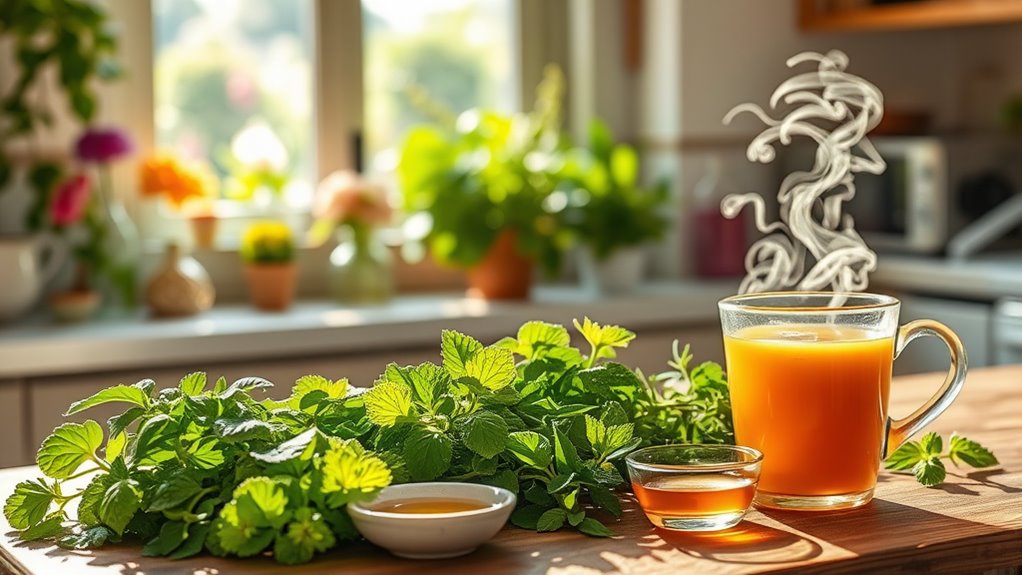I Beat Seasonal Allergies Naturally-Here’s What Helped Most
If you’re tired of sneezing your way through spring, you’re not alone. Seasonal allergies can be a real challenge, but finding natural solutions might be your key to relief. By making simple dietary changes, incorporating herbal remedies, and adjusting your lifestyle, you can effectively manage your symptoms. Curious about the specific strategies that worked for me? Let’s explore some practical steps you can take to reclaim your enjoyment of the season.
Key Takeaways
- Incorporating anti-inflammatory foods like leafy greens and berries can help reduce allergy symptoms significantly.
- Staying hydrated flushes out allergens and helps relieve congestion effectively.
- Using herbal remedies such as nettle and butterbur can reduce histamine production and ease nasal congestion.
- Essential oils like eucalyptus and peppermint can act as natural decongestants and open airways for easier breathing.
- Limiting outdoor activities during peak pollen times and keeping humidity low can minimize exposure to allergens.
Understanding Seasonal Allergies
Seasonal allergies, often triggered by pollen from trees, grasses, and weeds, can make certain times of the year particularly challenging. To combat these pesky symptoms, you need to understand what causes your reactions.
When pollen levels rise, your immune system overreacts, leading to sneezing, itching, and congestion. Thankfully, several allergy remedies can provide relief. Over-the-counter antihistamines can help manage symptoms, while nasal sprays reduce inflammation. Additionally, staying indoors on high pollen days and using air purifiers can make a big difference. Incorporating anti-inflammatory foods into your diet may also help minimize allergic reactions.
Dietary Changes That Made a Difference
Making simple dietary changes can greatly alleviate the symptoms of seasonal allergies. Start by incorporating anti-inflammatory foods like leafy greens, berries, and fatty fish into your meals. These foods can help reduce inflammation and support your immune system.
Also, consider cutting back on processed sugars and dairy, as they can worsen allergy symptoms for some people.
Staying hydrated is essential, so drink plenty of water to help flush out allergens.
Finally, try eating local honey; it might help your body adapt to local pollen. Additionally, incorporating foods rich in quercetin, vitamin C, and omega-3 fatty acids can significantly bolster your immune response against allergens. Small adjustments can lead to significant relief during allergy season, making a world of difference.
Herbal Remedies to Consider
In addition to dietary changes, herbal remedies can offer significant relief from allergy symptoms. Consider incorporating these powerful herbs into your routine:
| Herb | Benefit |
|---|---|
| Nettle | Reduces histamine production |
| Butterbur | Eases nasal congestion |
| Quercetin | Acts as a natural antihistamine |
| Eyebright | Soothes itchy, watery eyes |
| Peppermint | Opens airways and relieves sinus pressure |
Try these herbal remedies to combat your seasonal allergies naturally. Remember, it’s crucial to consult your healthcare provider before starting any new treatments to make sure they’re right for you. Additionally, many of these herbs possess anti-inflammatory properties that can further enhance your overall health and well-being.
The Role of Essential Oils
Essential oils can be a powerful ally in managing seasonal allergies.
You’ll want to explore top options like lavender, peppermint, and eucalyptus, known for their soothing properties. Learning the best ways to apply these oils can help you breathe easier and find relief naturally. Incorporating essential oils into your routine can complement other methods of natural allergy relief that support your immune system.
Top Essential Oils
When it comes to easing seasonal allergies, a few standout essential oils can make a significant difference. Lavender oil is known for its calming properties and can help reduce inflammation. Peppermint oil opens up your airways and offers an invigorating sensation.
Eucalyptus oil acts as a natural decongestant, promoting easier breathing. Tea tree oil has antibacterial qualities that can combat allergens. Finally, lemon oil is great for detoxifying and uplifting your mood.
Incorporating these essential oils into your routine can provide you with relief, making your allergy season more manageable and enjoyable.
Application Methods
How can you effectively harness the benefits of essential oils during allergy season?
Start by diffusing oils like lavender or peppermint in your living space to cleanse the air and promote easier breathing.
You can also create a roller blend with a carrier oil, applying it to pulse points like your wrists and behind your ears for quick relief.
Inhale the oils directly from the bottle or add a few drops to a warm bowl of water for steam inhalation.
Finally, consider adding essential oils to a warm bath to help relax and soothe your body while combating allergy symptoms.
Lifestyle Adjustments for Allergy Relief
Are you tired of sneezing your way through the spring months? Making a few lifestyle adjustments can greatly ease your allergy symptoms.
Start by incorporating a daily routine of exercise; it boosts your immune system and helps clear nasal passages.
Staying hydrated is essential, too, as it thins mucus and reduces congestion.
Consider adding local honey to your diet; some believe it may help your body adapt to pollen.
Finally, try to limit outdoor activities during peak pollen times, usually early morning. Additionally, keeping humidity levels below 50% can prevent mold growth, which may also contribute to allergy symptoms.
Creating an Allergy-Free Environment
To create an allergy-free environment, start by decluttering your living spaces to minimize dust and allergens.
Consider using air purifiers to filter out pollutants and improve the air quality in your home. Additionally, maintaining humidity levels between 30-50% can help prevent mold and dust mites from thriving.
These simple steps can greatly reduce your allergy symptoms and help you breathe easier.
Declutter Living Spaces
Ever wondered how a clutter-free space can greatly reduce your allergy symptoms?
By decluttering, you’re not just making your home look nice; you’re also eliminating dust, mold, and pollen traps.
Start by tackling one room at a time—clear surfaces, organize belongings, and get rid of items you don’t use.
Use storage bins to keep things tidy.
Don’t forget to wash linens regularly, as they can harbor allergens too.
A neat environment makes it easier to maintain clean air, helping you breathe easier.
Take these steps, and you’ll be on your way to a healthier, allergy-free home!
Use Air Purifiers
Maintaining a clutter-free space is just one step toward creating an allergy-free environment; using air purifiers can greatly enhance your efforts. These devices filter out allergens like pollen, dust, and pet dander, improving your indoor air quality.
Look for HEPA filters, as they effectively capture small particles. Place purifiers in common areas, especially bedrooms, where you spend a lot of time.
Remember to clean or replace filters regularly to keep them functioning efficiently. By incorporating air purifiers into your home, you’ll breathe easier, sleep better, and greatly reduce allergy symptoms, making your living space a healthier sanctuary.



